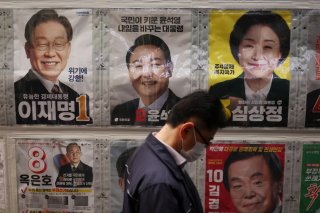What South Korea’s Election Means for Biden and Democracy
The election’s result will determine the state of democracy in South Korea for the next five years and the country’s place in Joe Biden’s Indo-Pacific strategy.
Yet, a closer look at their rhetoric in Korean and respective rosters of policy advisors reveal stark contrasts in their foreign policy approaches. Lee’s key advisors, internal campaign politics, support base, and the candidate’s own style portend either uncertainty ahead or clear breaks from his English essay. If so, some turbulence with Washington can be expected. South Korea’s progressive governments have traditionally taken a parochial approach to their foreign policy by prioritizing inter-Korean relations and autonomy from the United States over all issues. This could spell discord with Washington in North Korea policies while cooperation on Biden’s and Europe’s Indo-Pacific strategies could be placed on the back burner.
Lee’s unpredictable personality is the main wild card in delivering on his foreign policy vision, which he has pinned on the catchphrase “self-reliant diplomacy centered on national interest.” Despite his self-proclaimed pragmatism, Lee is known for playing to his base and flip-flopping stances on policy issues, often going off script. The test will be whether Lee will walk the talk of a pragmatist and which faction of advisors will have the president’s ear. Reports of schisms have already surfaced between his advisors: Lee Jong-seok (former unification minister and deputy head of the National Security Council) in charge of Korean Peninsula policy whose team is known as the “[U.S.] independence and autonomy faction” versus Wi Sung-lac [a former career diplomat] heading his foreign policy team that is known as the “[U.S.] alliance faction.”
It will be difficult for candidate Lee to completely ignore the hard left that harbors anti-Japan and anti-U.S. sentiments while being sympathetic toward North Korea and China. It was no coincidence that Lee blamed the United States for “consenting” to Japan’s colonization of Korea (1910-1945) and for Korea’s division after the War during a meeting with visiting Senator Jon Ossoff (D-GA) last November. Lee also said last August, “There is no reason to narrow the scope of your own destiny by choosing one or the other [country]. Competent diplomacy means making the U.S. and China choose to cooperate with us.” At the same time, he has been trying to differentiate himself from Moon, mindful of younger voters who are critical towards China and North Korea. Still, Lee said during a recent presidential debate that "a novice politician [Zelenskyy] who only has six months of political experience became the country's leader and caused a major clash by inciting Russia with a hasty promise of Ukraine's NATO admission. This is an example of a diplomatic failure." These comments suggest he might continue the progressives’ traditional line of hedging and taking softer stances on North Korea and China.
On other hand, Yoon as president will likely revive conservative foreign policies that are centered on a strong U.S. alliance and principled engagement with North Korea. He and his advisors are also determined to be a reliable team player in Biden’s regional and global initiatives. The alliance is expected to run more smoothly. But Yoon’s administration will want a greater voice as equal partners in alliance matters, which could cause tensions. Some of their demands could be either impossible or difficult for Washington to support. For example, some of Yoon’s advisors and supporters desire the return of tactical U.S. nuclear weapons to Korea, the NATO model of “nuclear sharing” with Washington, the greenlight to instantly retaliate after North Korean kinetic provocations, and even South Korea’s own nuclear deterrent. Yoon said in a recent presidential debate, "You can only prevent war when you have the capability for preemptive strikes and have the intent to do so … I believe the case of Ukraine shows that you cannot protect national security and peace with paper and ink.” His comment reflected the importance he places on military power and strong alliances.
In his Foreign Affairs essay, Yoon pledged that South Korea will be a “global pivotal state,” which is problematic in its English translation. Not only is the full term grammatically incorrect, but pivotal states have long described developing countries with uncertain futures—a “rotten apple in a barrel” or “falling domino”—that could easily pivot or fall to communism or affect international stability. Whether one is an academic or has a native English ear, Yoon could be (mis)interpreted to mean he is placing the country lower than South Korea’s self-proclaimed “middle power” status, or signaling that South Korea could pivot to, for example, China or Russia if it was not happy with the United States. Yoon also wrote that he aims to “establish an international cyber-cooperation network to support the efforts of the UN Group of Governmental Experts”—an entity that no longer exists.
Twists and turns are expected in the remaining few days until Korean voters head to the polls. At the last minute, conservative candidate Yoon merged with a third-party candidate Ahn Cheol-soo on the eve of early voting in hopes to secure more votes. But mergers in Korean politics have not always led to victories.
The result is highly unpredictable. One thing is clear: whoever wins will not only affect the future of South Korea, but U.S. policies in the Indo-Pacific as well.
Duyeon Kim is a Seoul-based Adjunct Senior Fellow with the Center for a New American Security and a Columnist with the Bulletin of the Atomic Scientists. She specializes in the two Koreas, nuclear nonproliferation, East Asian relations, arms control, and security regimes.
Image: Reuters.

